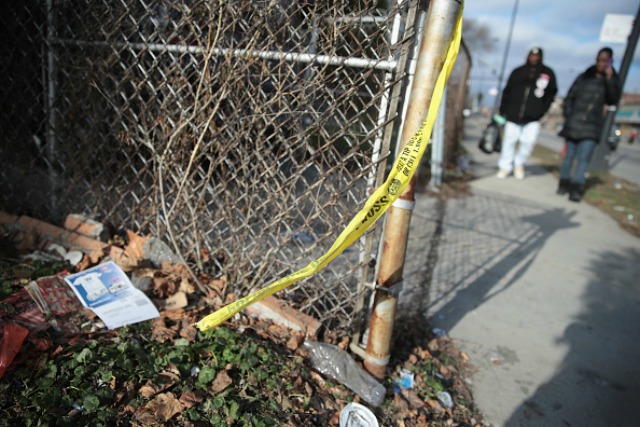2016 Was Chicago's Deadliest Year In Two Decades
By Stephen Gossett in News on Jan 2, 2017 4:34PM

Getty Images / Photo: Scott Olson
Chicago ended the year with its highest homicide total in 20 years. 762 people were killed in 2016, and the city logged over 3,500 shooting incidents, according to recently released data by the Chicago Police Department.
The homicide figure is largest since 1996, which saw 796 people killed. Shooting incidents increased by more than 1000 over 2015: There were 3,550 last year versus 2426 the year prior, according to Chicago Police Department data. The number of homicides is slightly higher according to other, non-official counts, due to the fact that CPD doesn’t include circumstances such as fatal police-involved shootings or expressway homicides. For instance, the Tribune tally totals at least 781.
At a press conference on Sunday, Superintendent Eddie Johnson said “anti-police sentiment” and a negligent criminal justice system were in part to blame. “In many instances, the individuals who chose to pull the trigger are repeat gun offenders emboldened by the national climate against law enforcement and willing to test the limits of our criminal justice system,” Johnson said, as quoted in the Trib by reporters Katherine Rosenberg-Douglas and Tony Briscoe.
"In Chicago, we just don't have a deterrent to pick up a gun," he added, according to Fox. "Any time a guy stealing a loaf of bread spends more time pre-trial in jail than a gun offender, something is wrong.”
Anthony Guglielmi, the police department's communications director, said the rise began “at the outset of the year” and called it “unacceptable.”
Chicago's homicide rate was a national news topic throughout much of the year, most recently in a 60 Minutes segment called Crisis In Chicago. Johnson, was among the interview subjects, reiterated his argument that police are "cautious about doing their jobs” in the face of increased public scrutiny.
The Sun-Times reports that police said city and department anti-violence initiatives in the new year include more support for youth in crime-plagued communities and economic incentives for retailers and manufacturers who set up shop in underserved communities. More than short sentences or low police stop rates, hopelessness stemming from under-invested communities is the key driver of violent crime in Chicago, some experts have argued.